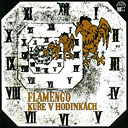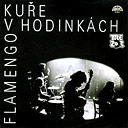Flamengo – Stále dál
from album “Kuře v hodinkách”, 1972, Supraphon 0131287 (mono) or 1131287 (stereo) and 101287-1311 (reissue 1990); also on CD “Kuře v hodinkách”, 1972/1998, Bonton 4910532; SP “Kuře v hodinkách”, 1972, Supraphon 0431453; CD compilation “Paní v černém (singly 1967-1972)”, 2003, Supraphon SU5496-2311
produced by Hynek Žalčík


original 1972 LP sleeve & 1990 LP/CD reissue sleeve
“… stále dál, stále dál, stále dál. Slepeckou holí mám spočítaný jak dlouhý je mý bytí, který je mi jednou daný.”
“… on and on, on and on, on and on. With a blindman’s white stick I’ve added up how long will my being last that I’ve been given.”
Every time I hear this chorus I shiver all over. Ever since I’ve heard the song for the first time some seventeen years ago. So I was quite surprised to read that even the old sound engineer who originally recorded it also feels the same way after 35 years. Anyway, here we go with the part 2 of the Flamengo story:
The basic idea behind the album Kuře v hodinkách (The Chicken In The Wrist-Watch) was to bring progressive contemporary Czech rock music to the public. While it may sound as a simple matter of fact to you today, it wasn’t an easy task in communist Czechoslovakia of the early 1970s; read my introduction for more background. The young Supraphon producer Hynek Žalčík (1949-2005) came with the nearly “subversive” idea to ask the poet Josef Kainar (1917-1971) to write the lyrics for the album. The “Kainar plan” was based on Kainar’s communist party membership, although he was definitely not very popular anymore by his conservative and “normalized” party comrades. But at that time he also was the chairman of the Czechoslovak Writers Association and a widely respected writer who also used to write blues songs. That aside, one year earlier they have already successfully collaborated on the Michal Prokop & Framus Five jazz-rock suite Město Er. So that trick helped Žalčík once again to convince the responsible Supraphon bureaucrats to release a rock album played by a bunch of untamed long-haired freaks who would have been de facto and de jure (i.e. according to communist jurisdiction) considered potential enemies of the state. The compromise was that the record was originally sold solely to the members of the “Czechoslovak Hi-Fi Club” in a total edition of only a few thousand copies. A political decision of course: Flamengo would have sold easily tens if not even hundreds of thousands copies over the years to all the other rock-hungry long-haired freaks out there. But any attempts for an official re-edition have been rejected by the authorities until 1989. Only two tracks (Já a dým, Kuře v hodinkách) re-appeared on the scarce Josef Kainar tribute compilation Obelisk in the late seventies; again thanks to Žalčík’s tireless effort.
Stále dál (On And On) is the only track from Kuře v hodinkách that isn’t sung by Vladimír Mišík. Instead, it’s the voice of organist Ivan Khunt and it’s the last of only three Flamengo songs they ever recorded with him as the lead singer. Apart from the short instrumental intro track it’s also the album’s only song without Kainar’s lyrics since Kainar passed away in November 1971. The words then came from producer and occasional lyricist Žalčík, the composition was the work of the “triple K” Khunt, Kubík and Kulhánek. Yet this song is a bomb and then some.
Due to the increasing communist oppression on rock groups in general, Flamengo eventually disbanded before the album has been finally released in 1973. The nucleus of the group along with Žalčík helped to record Dežo Ursiny’s debut album Provisorium and they established the first issue of Energit (see this post). Khunt and Šedivý exiled soon thereafter which made any reissue of Kuře v hodinkách or any other record with their participation practically impossible. Guitarist Fořt started to work with the group of former jazz musicians Strýci (a.k.a. Šest strýců) for Helena Vondráčková, joined the Karel Gott orchestra and led his own session studio band Labyrint. It was also Labyrint with Kubík’s and Kulhánek’s participation who re-recorded Rám příštích obrazů and Doky vlaky hlad a boty for the C&K Vocal fantastic debut album Generace (Generation). Kubík and Kulhánek worked as session musicians here or there, in the mid seventies they co-founded the jazz-rock supergroup Bohemia. Kubík escaped to the West in the 80s, while Kulhánek eventually joined Mišík’s Etc group. Mišík courageously kept on keeping on, on and on.
Nowadays there’s a restaurant in Prague named after the album “Kuře v hodinkách“. On their nicely designed web site there’s a photo gallery with lots of pictures from Czech rock history. Czech it out.
Vinyl should be available on eBay or on Gemm (some sellers still confuse Flamengo with Flamingo though). Some of the records are incredibely rare so don’t get shocked by the prices. But even the “über-rare” single Každou chvíli happens to be seen every now and then (although usually it’s definitely way over my budget). Fortunately, the songs I’ve presented are available not only on the remastered edition of Kuře v hodinkách, but also on the ultimate Flamengo “singlology” Paní v černém (The Lady In Black – Singles 1967-1972). If you dig prog-rock, get the former. If it’s fuzz guitars that makes your underpants wet, get the latter. If you just love music and you’d like show some respect for the involved musicians and producers and their exceptional work, get ’em all. On and on.
P.S. Kuře v hodinkách is one of the three albums that I would take with me on a desert island. Just for the record, the other two are Frank Zappa’s Over-Nite Sensation as well as Mothership Connection by Parliament. On those three records every single note makes me feel good. (Oh, and if I had any chance to take a fourth one with me, it would be SAHB Stories by the Sensational Alex Harvey Band… :))
P.P.S. Tell me about your three desert island albums in the comments –>
On and on (The chicken, part 2)
Posted in Funky Czech-In
4 Comments
Comments are closed.

Well, it’s not easy to name 3 albums, but I’ll try. First, I’ll take Batmobile “Bambooland” LP. It is neo-rockabilly from 1986. Then, I think, Alisa “Energy” ’86, Russian rock band, and finally, Bach organ works. But how I could listen to them on a desert island – that’s the question ;)
Pingback:Every while (The chicken, part 1) – Funky Czech-In
Pingback:The best woman of our days – Funky Czech-In
Pingback:What’s preventing me… – Funky Czech-In